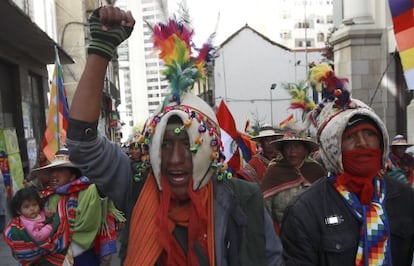Indigenous march against road plans rekindles racism
Bolivian court rules referendum is legal if consensus is reached with Indians

Despite being greeted with racial slurs and threats in different towns across Bolivia's northern region, hundreds of members of the nation's indigenous tribes pressed on with their long march this week toward the capital La Paz to protest against the government's plans to build a highway through a pristine national park.
After descending some 4,500 meters from the Andean mountains, the protesters, who have been the victims of verbal abuse and threats on their journey, are expected to arrive in the capital later this week.
It is the ninth such countrywide march organized by the different tribes since President Evo Morales announced his plans last year to build the road through the Isiboro Sécure national park. Following a violent incident in September involving the police, who forcibly broke up a peaceful protest, Morales canceled the $420-million highway.
But he later announced plans to put the project to a vote. On Tuesday, the country's Constitutional Court ruled that the referendum's enabling law was legal but pointed out that the Morales government must win consensus from the tribes concerning the questions it plans on asking voters and the terms of the referendum.
The project has polarized the country. "If they try to pass through here, we will tear them apart;" "If we catch them, they'll hang;" and, "Those mules with llama faces won't be coming through here," are just a few of the insults and threats that have been heard against the native communities by residents and members of Morales' Movement toward Socialism (MAS) party.
Most MAS supporters back the road, which would link Beni department with Cochabamba by cutting through the Isiboro Sécure Indigenous Territory National Park. Those who support it are cattle ranchers, businessmen and transportation workers who will benefit from the route, which will also link with a major roadway in Brazil. The Brazilian government has offered to part-finance the project.
Those mules with llama faces won't be coming through here"
Last week radical groups set up barbed-wire barricades in the small town of San Ignacio de Moxos to prevent the protestors from marching through. It was a reminder of Bolivia's recent past, when indigenous communities were treated with distinction and "denied entry to public squares and prohibited from traveling on many urban streets," says Ismael Guzmán, a sociologist in Beni province.
In Bolivia, there are laws against racism and discrimination, including the prohibition of racial slurs and expressions. But that hasn't stopped many of the road's proponents.
In the small town of Yucumo, the Indians had to march in silence and in the early morning hours to avoid disturbing residents. There is wide support for the road in the communities in Beni, especially from the unions that represent coca leaf growers and farmers.
All of the insults are being documented in a complaint that the indigenous communities plan on filing with judicial authorities. One of the defendants named is Basilio Nolvani, mayor of San Ignacio de Moxos, who allegedly ordered all town officials out on the street to prevent the protestors from marching through.
"The CIDOB [confederation of indigenous communities] will file a complaint after this ninth march, but we don't expect anything," said Adolfo Chávez of the group. "What can we expect from a government that ignores the law and allows this type of discrimination to occur?"
Tu suscripción se está usando en otro dispositivo
¿Quieres añadir otro usuario a tu suscripción?
Si continúas leyendo en este dispositivo, no se podrá leer en el otro.
FlechaTu suscripción se está usando en otro dispositivo y solo puedes acceder a EL PAÍS desde un dispositivo a la vez.
Si quieres compartir tu cuenta, cambia tu suscripción a la modalidad Premium, así podrás añadir otro usuario. Cada uno accederá con su propia cuenta de email, lo que os permitirá personalizar vuestra experiencia en EL PAÍS.
¿Tienes una suscripción de empresa? Accede aquí para contratar más cuentas.
En el caso de no saber quién está usando tu cuenta, te recomendamos cambiar tu contraseña aquí.
Si decides continuar compartiendo tu cuenta, este mensaje se mostrará en tu dispositivo y en el de la otra persona que está usando tu cuenta de forma indefinida, afectando a tu experiencia de lectura. Puedes consultar aquí los términos y condiciones de la suscripción digital.








































